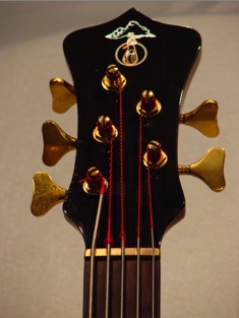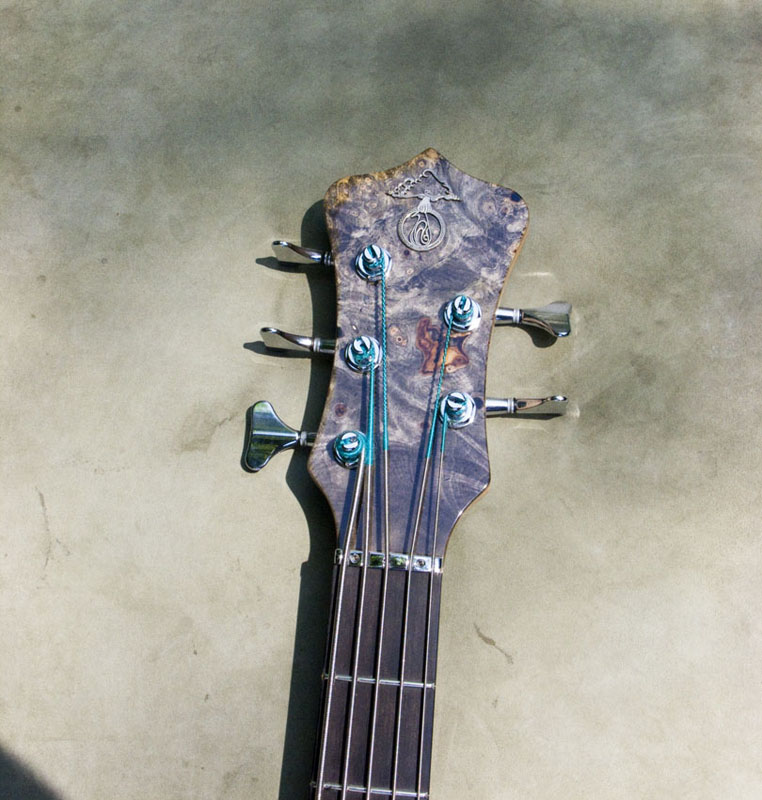| Author | Message | ||
| basser
New Username: basser Post Number: 3 Registered: 10-2008 |
I have a 3(left/upper) and 2(right/lower) crown head and like most other basses, all strings are winded inwards. Might be a irrelevant question but would it be OK, structually and sonically, to wind the B and/or the G string outwards? Is the normal way the best? Your thoughts would be much appreciated. Thanks! | ||
| basser
New Username: basser Post Number: 4 Registered: 10-2008 |
I've noticed the nuts are usually cut to suit inward winding, but if the nuts could accomodate an outward winding, what would be your thoughts? | ||
| jet_powers
Senior Member Username: jet_powers Post Number: 446 Registered: 2-2003 |
I guess I don't understand what you hope to accomplish using that technique..... | ||
| bassman10096
Senior Member Username: bassman10096 Post Number: 1205 Registered: 7-2003 |
Interesting question. Can't think of a reason why it would be a problem mechanically with a brass bridge. My son's bassist busted a bone nut by winding counterclockwise -- too much string pressure to the outside. But I doubt you'd ever bust out an Alembic nut. What are you hoping to gain by winding outward? | ||
| briant
Advanced Member Username: briant Post Number: 326 Registered: 12-2004 |
"I guess I don't understand what you hope to accomplish using that technique....." I was wondering the same thing. | ||
| pauldo
Intermediate Member Username: pauldo Post Number: 128 Registered: 6-2006 |
Andrew, I guess the best way to approach this is to see if the slot in the nut aligns more with the inside or the outside of the tuning post. Then wind accordingly to have the string in the straightest path from bridge/nut/tuner. Hope that helps - good luck. | ||
| altgrendel
Member Username: altgrendel Post Number: 84 Registered: 5-2008 |
I wouldn't do it. The change in the stress on the neck can't be good, even on an Alembic. Basically you're changing what's currently a straight pull from the tuning peg to the tailpiece into an angled pull at the nut; that's going to change the tension on the entire neck. It may be subtle, but you're changing the entire setup that way. (Message edited by AltGrendel on May 18, 2009) | ||
| basser
New Username: basser Post Number: 5 Registered: 10-2008 |
Thank you for the comments. Usually for the 3+2 crown head, it seemed to me that the E string passes the B tuning post quite closely. If the B tuning post has a lot of windings, then the E string might hit the B string. I'm not sure whether this will cause any problems sonically since the strings are aligned again starting from the nut but was thinking of a way to avoid the E string hitting the B string post, if it doesn't cause any other problems. | ||
| adriaan
Senior Member Username: adriaan Post Number: 2212 Registered: 6-2002 |
You should aim for about 3 to 4 windings around the post. That's about 2 to 2.5 inches of string length past the post - perhaps a little less for a B string. | ||
| jimmyj
Member Username: jimmyj Post Number: 68 Registered: 8-2008 |
I am guessing Andrew is talking about a situation like this:  That looks like a tossup as to which way the b-string should go. And I don't think the nut, tuner, or neck/headstock structure would be effected either way. It would be very unusual to have that key be the only reverse direction tuner but I bet nobody would notice unless they tried to tune it for you. It could be your secret tweak! Also, as Adriaan said, you don't need many windings to keep the string in place. My way is to start with the tuner's slot going the same direction as the neck, then I wind the string around 1 time, bend it down through the slot and then bend it outward. So I am only starting with 1-1/4 turns of string in contact with the tuner. I've never had a problem with slippage... Jimmy J | ||
| adriaan
Senior Member Username: adriaan Post Number: 2214 Registered: 6-2002 |
I always cut off the string about 2 inches above the tuner, stick the end in the hole that runs down the shaft, and bend the string as it leaves the slot. Then take the ball end out of the tail piece to let the string untwist itself, put the ball end back in its place and start winding up. | ||
| georgie_boy
Senior Member Username: georgie_boy Post Number: 730 Registered: 8-2005 |
I do exactly the same as Adriaan!!!! | ||
| basser
New Username: basser Post Number: 6 Registered: 10-2008 |
Thank you again for the comments. A lot of help! | ||
| jazzyvee
Senior Member Username: jazzyvee Post Number: 1477 Registered: 6-2002 |
here is a more recent example of string winding, that could be done either way. http://alembic.com/club/messages/395/65354.html?1242781216 Although this one seems to have a narrower nut width and would probably put the string very close to the edge of the headstock. Jazzyvee | ||
| jazzyvee
Senior Member Username: jazzyvee Post Number: 1478 Registered: 6-2002 |
here is a more recent example of string winding, that could be done either way. http://alembic.com/club/messages/395/65354.html?1242781216 Although this one seems to have a narrower nut width and would probably put the string very close to the edge of the headstock.  Jazzyvee |